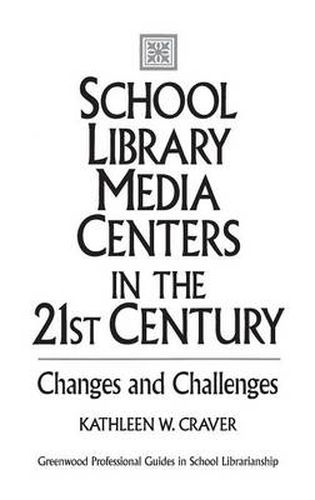Readings Newsletter
Become a Readings Member to make your shopping experience even easier.
Sign in or sign up for free!
You’re not far away from qualifying for FREE standard shipping within Australia
You’ve qualified for FREE standard shipping within Australia
The cart is loading…






School library media centres are at a critical juncture. Over the next decade, schools will undergo fundamental technological, economic, societal, instructional and administrative changes. Craver discusses the major forces for change confronting school libraries, analyses their implications as a guide for future decision making, and recommends that school library media specialists assume a leadership role in meeting these challenges. The work provides current data and statistics on future trends in technology, employment, education, society, instruction and school administration that can help the school library media specialist to formulate forceful arguments for the acquisition of new technologies, instructional reform, and full implementation of resource-based learning. School library media specialists who need to plan and make decisions about the future of their school libraries should find this book an invaluable resource. To visualise the future, Craver creates contrasting scenarios of utopian and dystopian school library media centres in the 21st century. Chapter 1, Technological Trends , discusses the digitalisation of all media and the implications of the technological revolution on the school library media centre. Chapter 2, Economic Trends , considers the impact of demographic changes and declining budgets and how to deal with them. Chapter 3, Employment Trends , outlines future trends in the workforce and suggests ways in which the school library can respond. Chapter 4, Educational Trends , charts the decline in literacy and the growing school reform movement. Chapter 5, Social and Behavioural Trends , discusses the change from a nation with minorities to a nation of minorities, and the transformation of the American family. Chapter 6, Instructional Trends , shows how the the instructional role of the school library media specialist will change with the presence of advanced technologies. Chapter 7, Organizational and Managerial Trends , describes the role the school library media specialist will have to assume as the technological, economic, educational and cultural changes affect the daily business of the media centre. Chapter 8, Challenges , focuses on a series of challenges in technology, performance-based programmes, collection development, instruction and organisation and management of the library media centre.
$9.00 standard shipping within Australia
FREE standard shipping within Australia for orders over $100.00
Express & International shipping calculated at checkout
School library media centres are at a critical juncture. Over the next decade, schools will undergo fundamental technological, economic, societal, instructional and administrative changes. Craver discusses the major forces for change confronting school libraries, analyses their implications as a guide for future decision making, and recommends that school library media specialists assume a leadership role in meeting these challenges. The work provides current data and statistics on future trends in technology, employment, education, society, instruction and school administration that can help the school library media specialist to formulate forceful arguments for the acquisition of new technologies, instructional reform, and full implementation of resource-based learning. School library media specialists who need to plan and make decisions about the future of their school libraries should find this book an invaluable resource. To visualise the future, Craver creates contrasting scenarios of utopian and dystopian school library media centres in the 21st century. Chapter 1, Technological Trends , discusses the digitalisation of all media and the implications of the technological revolution on the school library media centre. Chapter 2, Economic Trends , considers the impact of demographic changes and declining budgets and how to deal with them. Chapter 3, Employment Trends , outlines future trends in the workforce and suggests ways in which the school library can respond. Chapter 4, Educational Trends , charts the decline in literacy and the growing school reform movement. Chapter 5, Social and Behavioural Trends , discusses the change from a nation with minorities to a nation of minorities, and the transformation of the American family. Chapter 6, Instructional Trends , shows how the the instructional role of the school library media specialist will change with the presence of advanced technologies. Chapter 7, Organizational and Managerial Trends , describes the role the school library media specialist will have to assume as the technological, economic, educational and cultural changes affect the daily business of the media centre. Chapter 8, Challenges , focuses on a series of challenges in technology, performance-based programmes, collection development, instruction and organisation and management of the library media centre.